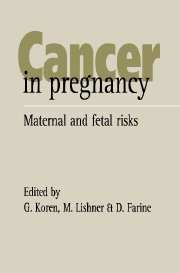Book contents
- Frontmatter
- Contents
- Preface
- List of contributors
- Part I Introduction
- Part II Specific tumors during pregnancy
- Part III Fetal effects of cancer and its treatment
- 16 Prenatal irradiation and cancer
- 17 Review of fetal effects of cancer chemotherapeutic agents
- 18 Fetal outcome following in utero exposure to cancer chemotherapy: the Toronto Study
- 19 Intrauterine causes of tumors in later life
- 20 Fetal tumors
- Index
18 - Fetal outcome following in utero exposure to cancer chemotherapy: the Toronto Study
from Part III - Fetal effects of cancer and its treatment
Published online by Cambridge University Press: 06 July 2010
- Frontmatter
- Contents
- Preface
- List of contributors
- Part I Introduction
- Part II Specific tumors during pregnancy
- Part III Fetal effects of cancer and its treatment
- 16 Prenatal irradiation and cancer
- 17 Review of fetal effects of cancer chemotherapeutic agents
- 18 Fetal outcome following in utero exposure to cancer chemotherapy: the Toronto Study
- 19 Intrauterine causes of tumors in later life
- 20 Fetal tumors
- Index
Summary
Cancer is the second leading cause of death among women during the reproductive years. Its occurrence during pregnancy is rare with an incidence of 0.07% to 0.1%. Over the years, significant advances have been made with current chemotherapeutic agents in increasing longevity and improving survival. Cures and long-term remissions are obtained in diseases that previously were untreatable. Oncologists, therefore, may be posed with a difficult challenge when a patient requires chemotherapy during pregnancy or becomes pregnant during the course of chemotherapy.
Although there are a variety of studies on the effects of chemotherapy during pregnancy on the fetus, review of the literature reveals that most reports are based on single cases cohorts with small sample sizes and cohorts that supply incomplete evaluation of the offspring.
Due to the rarity of chemotherapy use in pregnancy, it is unlikely that prospective studies will be undertaken. We therefore performed an historical cohort study to evaluate the effects of chemotherapy during pregnancy on fetal outcome, among women treated in the Princess Margaret Hospital (PMH) in Toronto between 1958 and 1947. We hypothesized that babies exposed to chemotherapeutic agents during the first trimester, when organogenesis takes place, may be more likely to suffer from major malformations than babies not exposed to chemotherapy or those exposed at subsequent trimesters. In addition, we hypothesized that suboptimal conditions in women with cancer receiving chemotherapy may increase the risk for spontaneous abortions, stillbirth, and lower birthweight for gestational age.
Methods
Cases with cancer in pregnancy who received chemotherapy while pregnant were extracted from the Princess Margaret Hospital's data base.
- Type
- Chapter
- Information
- Cancer in PregnancyMaternal and Fetal Risks, pp. 181 - 188Publisher: Cambridge University PressPrint publication year: 1996
- 1
- Cited by



